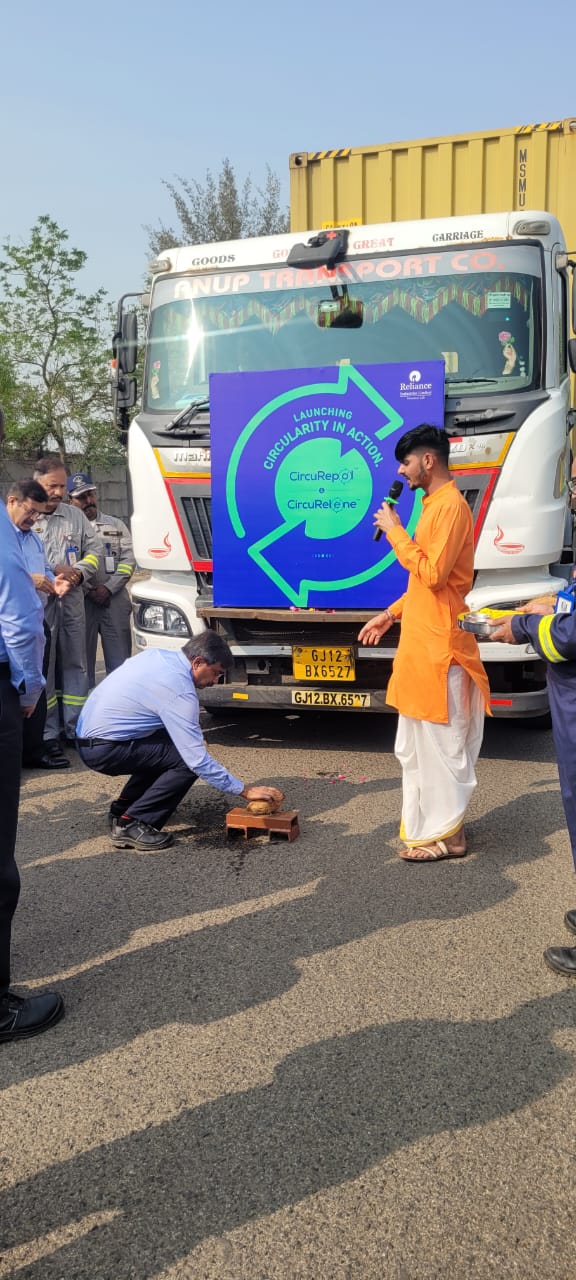Reliance Industries Becomes First Indian Co to Use Chemical Recycling For Circular Polymers
The new innovation is a testimony to the company's commitment in reducing plastic waste and supporting Circular Economy in India
FinTech BizNews Service
Mumbai, December 30, 2023: Reliance Industries Limited (RIL), operator of the world's largest integrated refining and petrochemical complex, has become the first Indian company to chemically recycle plastic waste-based pyrolysis oil into International Sustainability & Carbon Certification (ISCC)-Plus certified Circular Polymers. This new innovation is a testimony to RIL's commitment in reducing plastic waste and supporting Circular Economy in India. RIL shipped its first batch of ISCC-Plus certified Circular Polymers, named CircuRepol™ (Polypropylene) and CircuRelene™ (Polyethylene). RIL paves the way in India by using new technology to recycle plastic by converting plastic waste into special Circular Polymers, thereby making a positive impact on the environment. RIL’s commitment to sustainability is demonstrated through its innovative methods like chemical recycling which help create a Circular Economy. The company firmly believes in finding smart solutions to reduce plastic waste and inspire others to join in this journey towards a greener future. CircuRepol™ and CircuRelene™ have been designed to lead the way in Circular Economy practices. RIL's Jamnagar refinery became the first refinery to get the important ISCC-Plus certification, proving that it can produce Circular Polymers through chemical recycling. The ISCC-Plus certification guarantees that traceability and rules are followed in making Circular Polymers.
RIL has developed a technology that turns different types of plastic waste, including singleuse and multi-layered plastics, into pyrolysis oil. The company is working with trusted partners to increase the production of this oil and turn the yield into Circular Polymers. Chemical recycling has many benefits, including turning plastic waste into high-quality materials for new plastic. These materials can be used for packaging that comes into contact with food. About Reliance Industries Limited Reliance is India’s largest private sector company, with a consolidated revenue of INR 9,74,864 crore (US$118.6 billion), cash profit INR 1,25,951 crore (US$ 15.3 billion) and net profit of INR 73,670 crore (US$9.0 billion) for the year ended March 31, 2023. Reliance’s activities span hydrocarbon exploration and production, petroleum refining and marketing, petrochemicals, advanced materials and composites, renewables (solar and hydrogen), retail and digital services. Currently ranked 88th, Reliance is the largest private sector company from India to be featured in Fortune’s Global 500 list of 'World’s Largest Companies' for 2023. The company stands 45th in the Forbes Global 2000 rankings of 'World’s Largest Public Companies' for 2023, the highest among Indian companies. Reliance is the top-ranked Indian company and the only one in the top 100 on Forbes' 'World's Best Employers' 2023 list. Additionally, it is featured among LinkedIn’s 'Top Companies 2023: The 25 Best Workplaces To Grow Your Career In India.'
Groundbreaking Initiative:
- RIL's Jamnagar Refinery is now processing chemically recycled pyrolysis oil to produce ISCC-Plus certified circular polymers, CircuRepol™ (Polypropylene) and CircuRelene™ (Polyethylene).
- Chemical recycling is a new development where the waste plastic, mechanically not recyclable, is converted to pyrolysis oil by suitable cracking of long polymer chain. Currently, most of the pyrolysis processes are based on thermal route which leads to lower yield and inferior quality of pyrolysis oil. RIL has developed a continuous catalytic pyrolysis technology which provides high yields of good quality pyrolysis oil from plastic waste. The process has been successfully demonstrated at demo scale. Capacity and Processing:
- JMD has the capacity to process up to 600 TPM of chemically recycled pyrolysis oil from waste plastic. • RIL is developing existing pyrolysis producers into reliable vendors to ensure quality oil as per RIL specifications, with vendor capacities aiming to reach up to 600 TPM.
- Long-term plans include establishing in-house technology plants and scaling up capacities. Comprehensive Sustainability Goals: • RIL's pursuit of chemical recycling and Circular Polymers aligns seamlessly with its overarching sustainability goals.
- The company adopts a multi-pronged approach, including PET recycling – recycles 5 billion post-consumer PET bottles annually, recycles end-of-life plastics to make road – ReRoute™, as well as circular polymers. Benefits of Circular Polymers: • Reduce Plastic Waste.
- Accelerate Circular Economy. • Produce high-value end products. • Reduce stress on natural resources. Chain of Custody and ISCC-Plus Certification:
- RIL is ensuring the efficiency and reliability of chemical recycling by maintaining a chain of custody for the supply chain and obtaining ISCC-Plus certification for all members in the supply chain.
Challenges and Solutions
- Challenges include availability and consistent quality of chemically recycled oil, and high costs of branded technologies. • RIL is investing in research, development, infrastructure, scale-up, partnerships, and collaborations to overcome these challenges. Marketability and Acceptance: • Adherence to international sustainability standards enhances the credibility of circular polymers and allows access to markets that prioritize sustainability. Future Outlook: • RIL aims to reach an overall capacity of 1 MMT through all its sustainability initiatives by the year 2030.
- RIL is focusing on enabling Circular Economy through chemical recycling, with the current emphasis on establishing and increasing volumes rather than cost advantages. Despite myriad challenges, RIL is committed to reducing plastic pollution and championing circular economy. Demand and Market Growth: • The demand for Circular Polymers is on the rise, driven by increased awareness and regulatory initiatives. • RIL anticipates a positive response from customers and expects the premium for sustainable solutions to reduce as the industry shifts towards Circular Economy practices. Environmental Considerations: • There are no different precautions or considerations related to CircuRepol™ and CircuRelene™, as they work just like virgin products. • Responsible disposal is advised to continue the circular chain of recycling.
